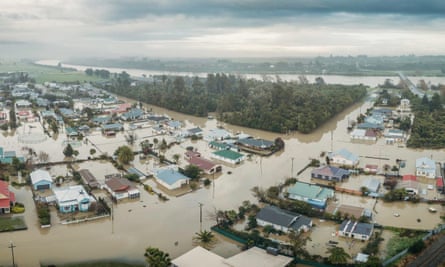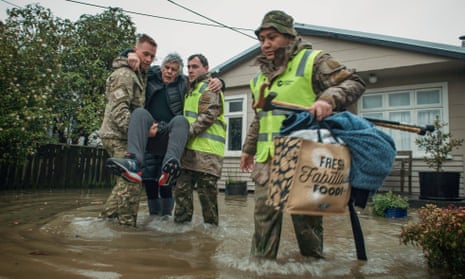New Zealand’s west coast has been hit by severe flooding, with a local state of emergency declared and thousands evacuated from their homes.
The latest floods arrived in the aftermath of heavy rains and storms over the past two months that prompted states of emergency in Canterbury and Wellington.
Paddocks on the West Coast flooding as a result of this weekend’s heavy rain. pic.twitter.com/ntD5HYWsOz
— Geoff Keey (@GeoffreyKeey) July 18, 2021
In parts of the west coast, around 300mm of rain fell over a single weekend – around a month’s average rainfall concentrated into two days. The heavy rain caused slips, rivers to break their banks, and more than 2,000 residents to be evacuated.

While no single flooding event can be directly attributed to the climate crisis, scientists have long warned that global heating would increase the number and likelihood of extreme weather events, including flooding, wildfires and heatwaves. As the atmosphere gets warmer, it holds more moisture, which in turn leads to heavier rainfall.
On Sunday, the government announced $600,000 in emergency aid to the affected districts. “While it is too early to know the full cost of the damage, we expect it to be significant … a big cleanup and recovery effort lies ahead,” the acting minister for emergency management, Kris Faafoi, said.
The agriculture minister, Damien O’Connor, announced financial support for farmers, saying that “the scale of impact is beyond the communities’ ability to cope”.
Here's how it looked earlier today at the Buller Bridge in Westport...
— NIWA Weather (@NiwaWeather) July 17, 2021
The Buller River level is near 12.4 m, down slightly from its peak level of 12.8 m today.@niwa_nz's hydrologists continue to work closely with the West Coast Regional Council. pic.twitter.com/7szTpuZtSa
While flood waters are now receding, cleanup of the region is expected to take some time. “In most cases it will take months, rather than weeks, to completely restore your home(s)” the West Coast District Health board said in a release to local residents.
Faafoi said on Sunday that about 1,000 people were still out of their homes in Westport.
The extreme weather comes as other parts of the world are reeling from flooding, including Germany, Austria, Belgium, the Netherlands, London, Edinburgh, and Tokyo. The floods across western Germany and Belgium have killed at least 180 people. In the same period, the western US and Canada have been hit by unprecedented extreme heatwaves, which led to hundreds of deaths.
Internationally, the recent floods have been prompting a political reckoning over climate change. Asked whether climate change had contributed to the disastrous floods in Europe, the prime minister of the Netherlands, Mark Rutte, said that was “without a doubt the case”.
In Germany, Chancellor Angela Merkel said the country had to “up the pace in the fight against climate change”.
